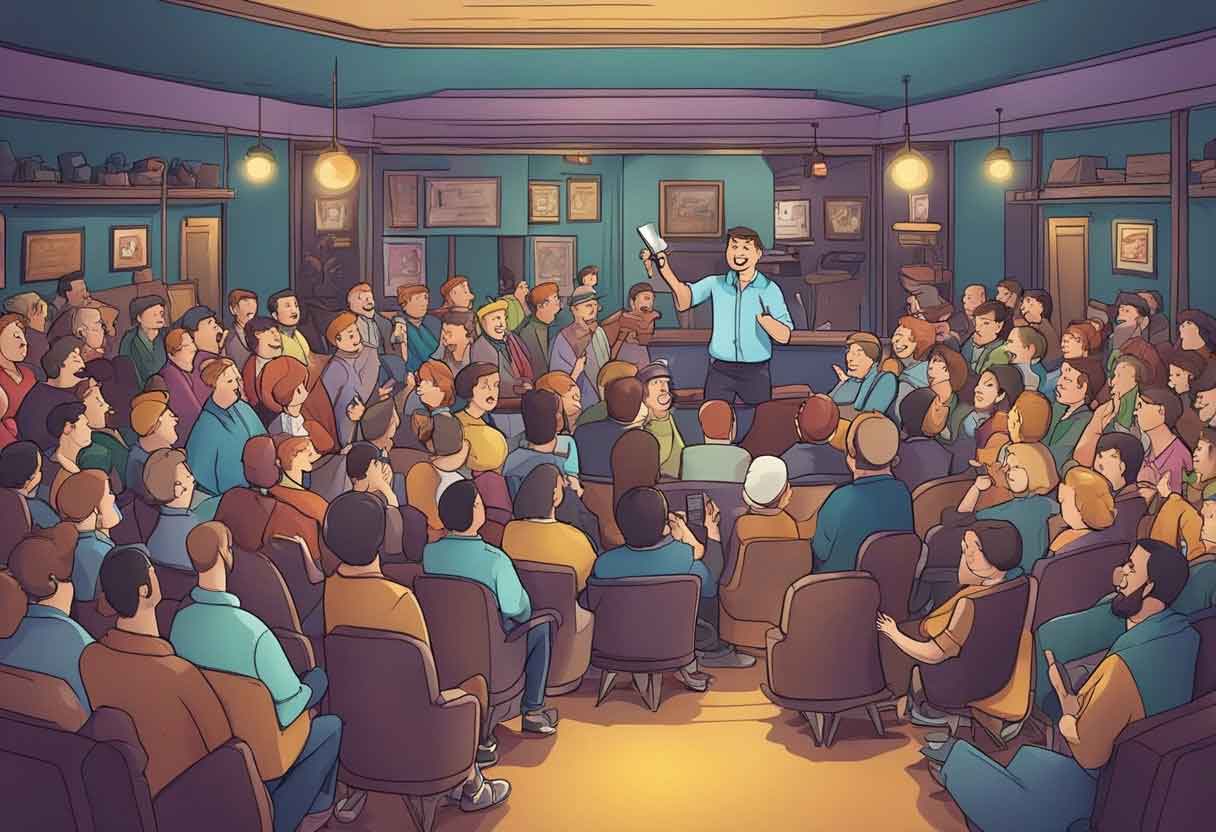Writing comedy is a challenging and rewarding art form that requires a unique set of skills. Whether you are an aspiring comedian or a writer looking to add humor to your work, learning how to write comedy can be a valuable tool in your arsenal.
Before you can start writing jokes, you need to figure out what kind of comedian or comedy writer you want to be…
What makes you unique?
What experiences do you have that others don’t?
What makes you laugh?
In this article, we will explore:
- the fundamentals of comedy writing and
- provide tips and techniques to help you improve your skills.

Pro Tip: 🏆 If you want to skip to the GOLD, I suggest scrolling down to the section below titled “Developing Material.”
To write comedy effectively, it is important to understand what makes people laugh.
Laughter is a response to:
- surprise,
- incongruity, and
- tension release.
Comedy writers use these elements to create humor in their work. They also use techniques such as:
- exaggeration,
- wordplay, and
- misdirection
to enhance the comedic effect.
Writing comedy can be a challenging task, but with the right approach, anyone can learn to do it well. By understanding the fundamentals of humor and using proven techniques, you can create comedy that resonates with your audience and leaves them laughing for days.
So, let’s dive into the world of comedy writing and explore the art of making people laugh.
Understanding Comedy

History of Comedy
Comedy has been a part of human culture for thousands of years.
The ancient Greeks and Romans had comedies as part of their theatrical performances. In the Middle Ages, jesters and clowns entertained royalty and peasants alike. In the 20th century, comedy became a popular form of entertainment in television and film.
Types of Comedy
There are many types of comedy, each with its own unique style and audience. Some popular types of comedy include:
- Stand-up comedy: A comedian performs in front of a live audience, often telling jokes and stories based on personal experiences.
- Sketch comedy: A series of short comedy scenes performed by a group of actors, often with recurring characters and themes.
- Improv comedy: A type of comedy where performers create scenes and characters on the spot, based on audience suggestions.
- Satire: Comedy that uses irony, sarcasm, and ridicule to expose and criticize societal issues and flaws.
- Parody: Comedy that imitates and exaggerates the style and content of another work, often for humorous effect.
Comedy Theory
Comedy theory is the study of what makes things funny. There are many theories on what makes things funny, but no one theory can explain all types of comedy. Some popular theories include:
- Incongruity theory: Comedy arises from the unexpected or surprising elements in a situation or joke.
- Superiority theory: Comedy arises from the feeling of superiority over someone or something.
- Relief theory: Comedy arises from the release of tension or anxiety.
Understanding the history, types, and theories of comedy can help writers create effective and engaging comedic content. By studying and analyzing what makes things funny, writers can develop their own unique comedic style and voice.
Developing Material

Finding Your Comic Voice
One way to find your comic voice is to try out different styles of comedy and see what feels natural.
Watch stand-up specials, attend open mic nights, and experiment with different types of humor. Don’t be afraid to bomb – it’s all part of the process.
Another way to find your voice is to write about what you know. Draw from your own experiences and observations to create material that is authentic and relatable. Don’t try to be someone you’re not – audiences can tell when a comedian is being insincere.
Creating Jokes
Once you have a sense of your comic voice, it’s time to start writing jokes.
There are many different techniques for creating jokes, but one approach is to mine your personal life for funny stories and anecdotes. Look for the absurdity in everyday situations and find ways to exaggerate or twist them for comedic effect.
From my personal experience on stage and online, the key to tapping into your God-given comedy voice is to avoid “trying” to be funny. Instead, aim to express your honest opinion, viewpoint or observation. People are drawn to authenticity, and what may not seem funny to you because you think this way every day, may be absolutely hilarious to others.
Another technique is the setup-punchline structure.
The setup establishes a premise or situation, while the punchline delivers the unexpected twist that makes the audience laugh. Good punchlines often involve wordplay, misdirection, or surprise.
Building a Routine
As you develop material, you’ll start to see patterns emerge. Certain jokes may work better together than others, and you’ll start to develop a sense of pacing and flow.
To build a successful routine, it’s important to pay attention to the structure and order of your jokes. Start with a strong opener to grab the audience’s attention, and end with a strong closer to leave them laughing. Use transitions and callbacks to tie your material together and keep the audience engaged.
Remember that comedy is subjective, and what works for one audience may not work for another. Keep testing and refining your material until you find what works best for you. With practice and perseverance, you can develop a strong and unique voice that will keep audiences laughing.
Organizing a Routine
I was hired to do a commercial for Speare App, which helps you organize a massive amount of material without getting overwhelmed. I have no skin in the game by promoting it to you here, but believe it’s worth mentioning in case you have a lot of comedy material to keep track of:
Writing Techniques

Wordplay and Puns
One of the most effective ways to add humor to writing is through the use of wordplay and puns. This technique involves using words that sound similar but have different meanings, or words that have multiple meanings.
Puns can be used to create unexpected twists or humorous situations. For example, using the phrase “time flies” in a story about a talking clock that actually flies would be a pun.
Timing and Pace
Timing and pace are crucial elements in comedy writing. The timing of a joke or punchline can make all the difference in whether it lands or falls flat.
A well-timed pause can build anticipation and create a sense of tension that can be released with a punchline.
Pace refers to the speed at which a joke or story is delivered. Varying the pace can help keep the audience engaged and prevent the humor from becoming repetitive.
Using Callbacks
Callbacks refer to references to earlier jokes or situations in a comedy routine or story. Using callbacks can create a sense of continuity and build on previous humor, making the audience feel like they are in on an inside joke. Callbacks can also be used to surprise the audience by bringing back a joke or situation they thought was finished.
Editing for Brevity
Comedy writing often involves editing and revising to make the writing more concise and effective. Removing unnecessary words or phrases can help sharpen the humor and prevent jokes from dragging on too long. It’s important to remember that brevity is often key in comedy, and that every word should have a purpose.
Performing Comedy

Stage Presence
When performing comedy, having a strong stage presence is crucial. This means being confident, comfortable, and engaging on stage. Good stage presence can help a comedian connect with the audience and make them feel at ease.
To improve stage presence, a comedian can practice their delivery, body language, and facial expressions. They can also try to project their voice and use the stage space effectively.
I don’t recommend practicing in front of a mirror. Instead, take the stance you plan to take in front of a live audience. Also, imagine you’re talking to a friend, if this type of friend exists, who tends to absolutely love your stories.
It’s important to remember that every comedian has their own unique style and approach, so finding what works best for them is key.
Dealing with Hecklers
Dealing with hecklers is a common challenge for comedians. A heckler is someone in the audience who interrupts the performance with comments or insults. It’s important for a comedian to handle hecklers in a way that doesn’t disrupt the show or offend the rest of the audience.
One approach is to acknowledge the heckler and respond with a quick comeback or joke. Another approach is to ignore the heckler and continue with the performance. It’s important to stay calm and not let the heckler derail the show.
Audience Interaction
Interacting with the audience can be a great way to connect with them and make the performance more engaging. This can include asking for volunteers, making eye contact, or even bringing someone on stage.
However, it’s important to be mindful of the audience’s comfort level and not make anyone feel uncomfortable or embarrassed. A comedian should also be prepared for unexpected responses or reactions from the audience and be able to adjust their performance accordingly.
Comedy Writing for Different Mediums

Stand-Up
Stand-up comedy is a unique and challenging form of comedy writing. It requires a comedian to create material that can engage an audience for an extended period of time. When writing stand-up comedy, it is important to keep the following in mind:
- Know your audience: Understanding your audience is key to writing successful stand-up comedy. A comedian should tailor their material to the audience they are performing for. For example, a comedian performing at a college campus will have a different audience than one performing at a comedy club.
- Write what you know: Writing about personal experiences is a great way to connect with an audience. Comedians should draw from their own experiences and find humor in everyday situations.
- Practice, practice, practice: Stand-up comedy is all about timing and delivery. Comedians should practice their material in front of an audience to get a feel for how it will be received.
Television and Film
Comedy writing for television and film requires a different approach than stand-up comedy. Writers must create characters, plotlines, and dialogue that will engage audiences over an extended period of time. When writing for television and film, it is important to keep the following in mind:
- Develop strong characters: Strong characters are essential to any successful television show or film. Writers should create characters that are relatable, interesting, and have unique personalities.
- Know your genre: Different genres require different approaches to comedy writing. A sitcom will have different comedic beats than a romantic comedy or a satire.
- Collaborate with others: Writing for television and film is often a collaborative process. Writers should be open to feedback and work closely with directors, producers, and other writers to create the best possible product.
Online Platforms
Comedy writing for online platforms, such as social media and YouTube, has become increasingly popular in recent years. Writing for these platforms requires a different approach than traditional forms of comedy writing. When writing for online platforms, it is important to keep the following in mind:
- Keep it short and sweet: Online audiences have short attention spans. Writers should create content that is short, snappy, and to the point.
- Use visuals: Visuals, such as memes and videos, are an important part of online comedy. Writers should incorporate visuals into their content to make it more engaging.
- Stay up to date: Online trends and memes change quickly. Writers should stay up to date on current events and online trends to create content that is relevant and timely.
The Business of Comedy

Marketing Yourself
As a comedian, it’s important to market yourself effectively to get your name out there and attract potential gigs. One way to do this is by creating a strong online presence through social media, a personal website, and YouTube videos showcasing your best material. It’s also important to have a professional headshot and bio readily available for potential clients.
Another effective marketing strategy is networking with other comedians, industry professionals, and event planners. Attend comedy shows and festivals, join local comedy groups, and participate in open mics to meet and connect with others in the industry.
Finding Gigs
Finding gigs as a comedian can be challenging, but there are several ways to increase your chances of getting booked. One way is to reach out to event planners and bookers directly, either through email or in person at comedy shows and festivals. It’s important to have a strong pitch and be able to showcase your experience and unique style.
Another effective strategy is to work with a talent agency or booking manager who can help you find gigs, negotiate contracts, and handle the business side of things. However, it’s important to do your research and make sure you’re working with a reputable agency or manager.
Networking
Networking is crucial in the comedy industry and can lead to valuable connections and opportunities. Attend industry events, participate in comedy workshops and classes, and join local comedy groups to meet other comedians and industry professionals.
It’s also important to maintain relationships with event planners, bookers, and other industry professionals you’ve worked with in the past. Send follow-up emails after gigs, thank them for the opportunity, and keep them updated on your upcoming shows and projects.
By effectively marketing yourself, finding gigs, and networking with others in the industry, you can increase your chances of success as a comedian.
Continual Improvement

Improving one’s comedy writing skills is a never-ending process. There are always new techniques to learn, styles to experiment with, and feedback to analyze. Here are some ways to continually improve your comedy writing:
Analyzing Feedback
One of the most important aspects of improving your comedy writing is analyzing feedback. Whether it’s from a fellow comedian, a friend, or an audience member, feedback can help you identify what’s working and what’s not. Take note of the feedback and use it to improve your future material.
Practicing Regularly
Practice makes perfect, and this is especially true for comedy writing. The more you write, the better you’ll become. Set aside time each day to write, even if it’s just for a few minutes. This will help you develop your skills and keep your creativity flowing.
Evolving Your Style
Comedy writing is not a static art form. Styles and trends change over time, and it’s important to stay up-to-date with the latest developments. Experiment with different styles and techniques to keep your writing fresh and engaging. Don’t be afraid to take risks and try something new.
In conclusion, continual improvement is essential to becoming a successful comedy writer. Analyzing feedback, practicing regularly, and evolving your style are just a few ways to keep your skills sharp and your material fresh. Keep learning, keep writing, and never give up on your dreams of making people laugh.

